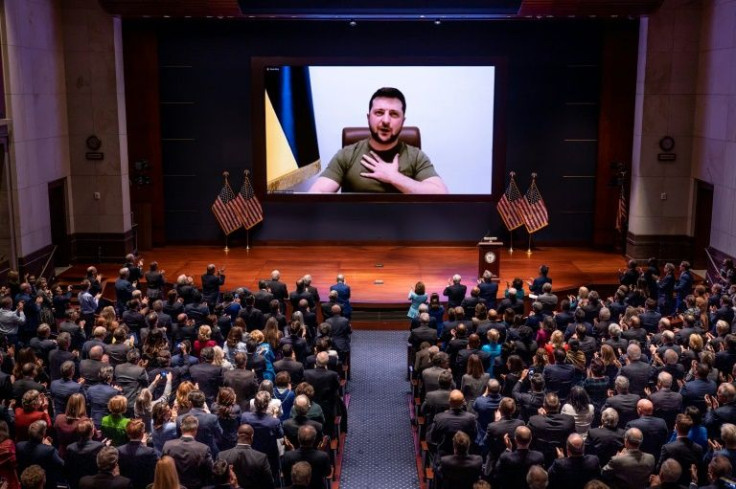'Prove You're With Us': Zelensky's Appeals To Western MPs
When rallying British MPs Ukrainian President Volodymyr Zelensky reaches for Churchill. When addressing the US Congress he invokes Pearl Harbour. When beamed into the Bundestag he conjures the threat of a new wall in Europe.
In an address to French lawmakers, Zelensky invoked the wartime suffering their nation endured a century ago, saying images of devastated Ukrainian cities such as Mariupol "recall the ruins of Verdun as in the photos of World War I that everyone has seen".
Zelensky has won standing ovations in parliaments across the West with a series of impassioned addresses from wartime Kyiv tailored to each audience.
Here are other standout moments of Zelensky's virtual world tour.
On March 1, less than a week into the war, a haggard-looking Zelensky addresses the European Parliament.
The 44-year-old former TV actor frames the fight against Russia as a struggle to defend the European ideals for which Ukrainians staged two revolutions in the past two decades.
"Prove you are with us," he tells MEPs. "Prove you are not abandoning us and you are really Europeans," he says, a day after requesting fast-track EU membership for Ukraine.
On March 8, as the number of Ukrainians fleeing the fighting tops two million, he invokes the wartime defiance of British prime minister Winston Churchill in pledging a fight to the end.
"We will fight in the forests, in the fields, on the shores, in the streets," he tells the House of Commons, echoing Churchill's historic "We shall fight on the beaches" speech in the face of Nazi German advances in June 1940.
On March 15, as residential neighbourhoods in Kyiv come under attack, he asks MPs in Canada, the country with the world's second-largest Ukrainian diaspora, to imagine their cities and children being bombed.
"Please close the sky," he implores Prime Minister Justin Trudeau, calling for a no-fly zone over Ukraine.

On March 16, he brings members of the US Congress to their feet with a rousing speech comparing the bombardment of Ukrainian cities to the attack on Pearl Harbour that drew the United States into World War II.
As Ukraine mourns 10 people killed queueing for bread in the city of Chernigiv, Zelensky likens the Russian invasion to the September 11, 2001 terror attacks in the US, "when evil tried to turn your cities... into battlefields".
One of his most powerful speeches is to MPs in German on March 17, as reports emerge that a theatre accommodating hundreds of civilians in Mariupol has been reduced to rubble.
Zelensky warns that Russia is erecting a new "wall" in Europe between "freedom and bondage" and calls on German Chancellor Olaf Scholz to tear it down, echoing US President Ronald Reagan's 1987 appeal to Soviet leader Mikhail Gorbachev.
After hitting the right notes with his European and US audiences Zelensky, who is Jewish, draws criticism in Israel after a speech to the Knesset on March 20 comparing the Russian invasion to the Holocaust.
Urging Israel, which has not joined in Western sanctions against Russia, to step up for Ukraine, he declares: "Ukraine made the choice to save Jews 80 years ago."
He is rebuked by Israel's Communications Minister Yoaz Hendel, who notes that part of the genocide of Europe's Jews took place in Ukraine.
On March 22, he tells lawmakers in Italy, long a top holiday destination for rich Russians, to stop being a playground for Russia's elite.
"Don't be the place that welcomes these people," he urges.
He followed up with Wednesday's 15-minute video address to French lawmakers in which he urged their nation's firms to quit the Russian market, saying that "Renault, Auchan, Leroy Merlin and others must stop sponsoring the Russian war machine".
© Copyright AFP {{Year}}. All rights reserved.





















